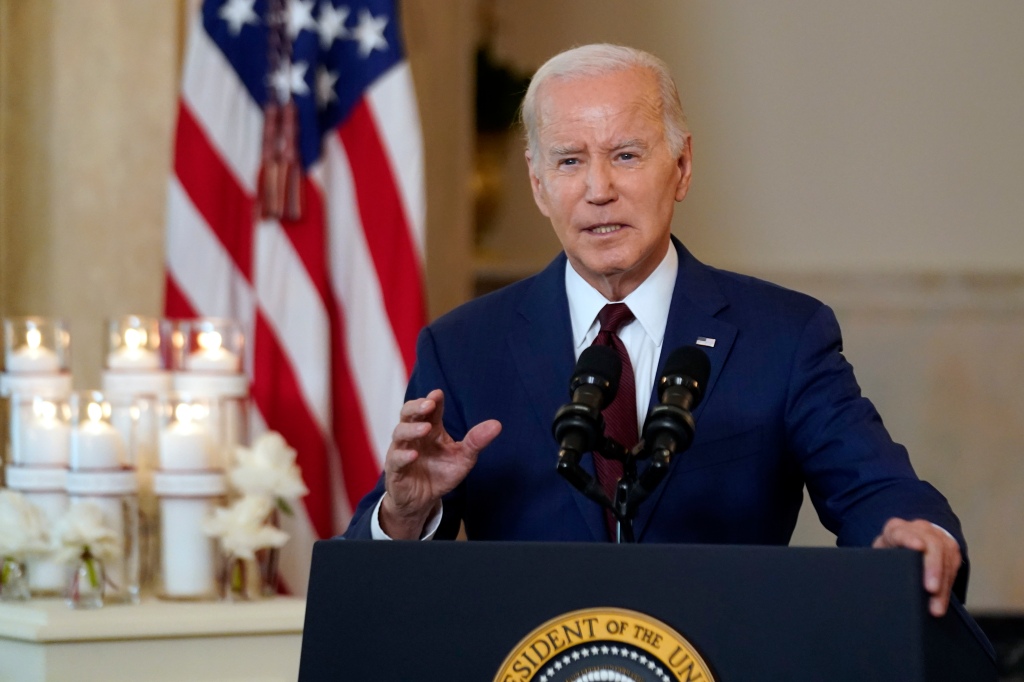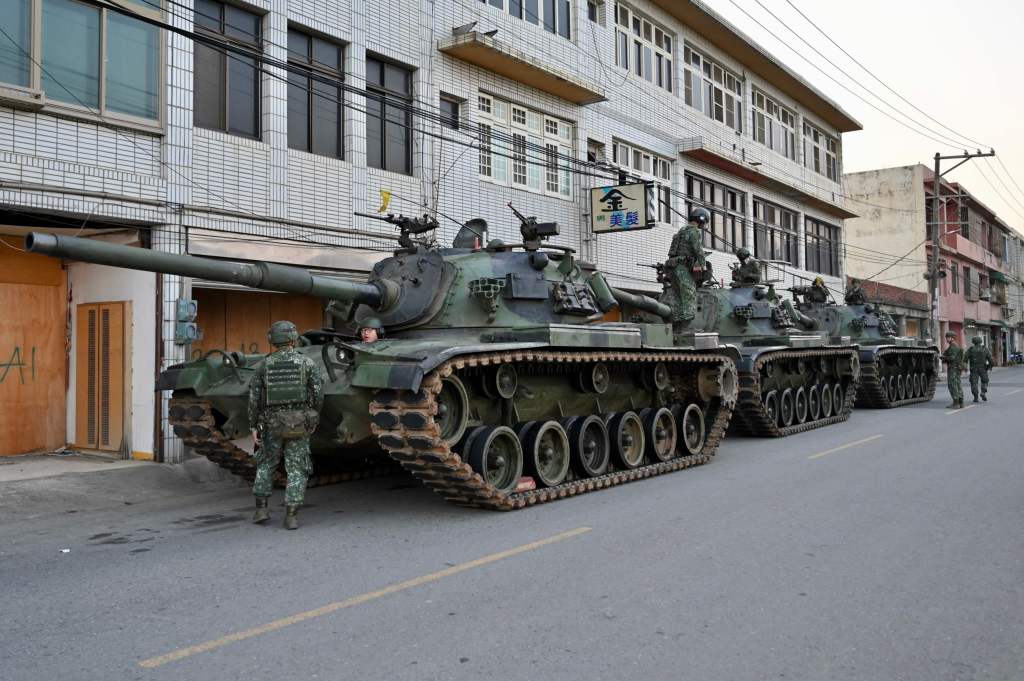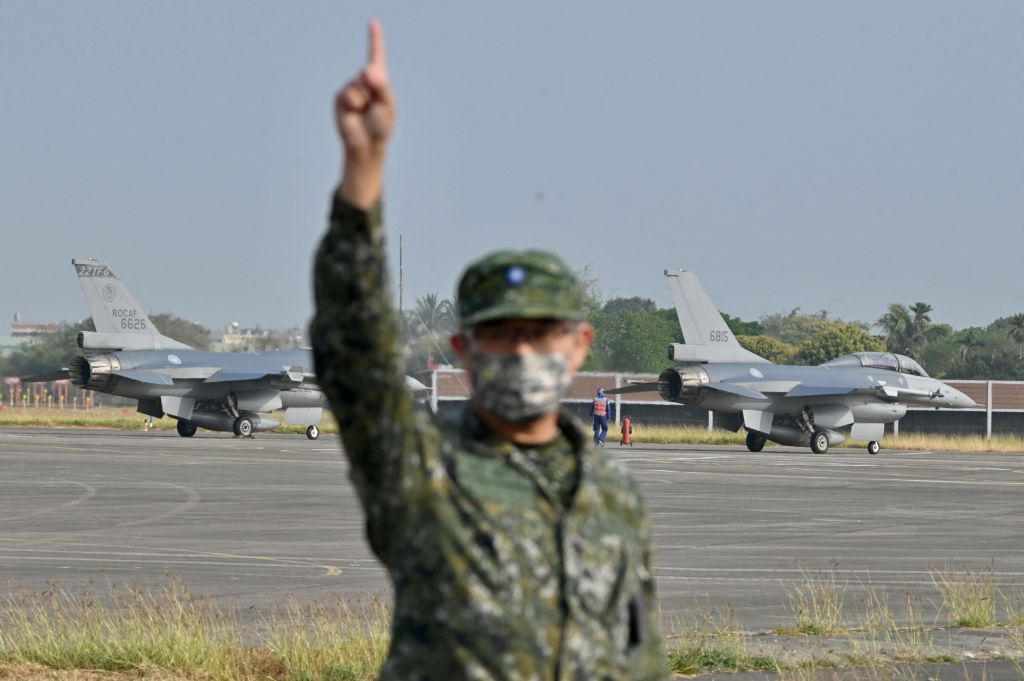‘Ten for Taiwan’ blueprint on countering CCP published
WASHINGTON – A special report outlining the steps needed to be taken to prevent war with China over Taiwan was released Wednesday by a Select Subcommittee.
Following its release, Rep. Mike Gallagher told The Post about the importance of a bipartisan approach and how he doesn’t believe foreign policy should be left to President Biden alone.
“Here you have Article One [of the Constitution] – the legislative branch – coming out identifying what we need to do to push back on CCP aggression and that sort of inherent recognition foreign policy is not the sole province of the executive,” Gallagher (R-Wisc.) said in an interview with The Post.
The report, titled “Ten for Taiwan,” offers lawmakers a blueprint on what Congress can do to deter Beijing from launching an assault on the self-governed, Democratic island just 100 miles off of China’s Southeastern coast, the subcommittee chairman said.
“Congress needs to claw back some of its authority and particularly, we want our grand strategy vis-a-vis China to last longer than a single administration,” Gallagher said. “We want it to rest on a bipartisan framework because this competition is not a short one.”
While Beijing has never governed the island, it considers Taiwan as China’s sovereign territory despite Taipei’s objections. The US acknowledges China’s stance under the “One China Policy,” but Washington considers the island’s sovereignty status unsettled.
Defense experts and top military officials have warned for years of Chinese President Xi Jinping’s intent to “reunify” with Taiwan either diplomatically or by force, the latter of which the US has a responsibility to defend against under the 1978 Taiwan Relations Act.
Hesitance in provoking Beijing has resulted in timid stances and hushed actions out of the executive branch, especially under the Obama and Biden administrations. But as US-China relations grow ever more tense, the once-believed theory that America could prevent China from making moves on Taiwan by increasing economic interaction has become less and less relevant, Gallagher said.
“The idea that the act of not doing what is necessary to secure US interests due to an excessive fear of provoking a bully who already plans to bully you or is already bullying you is a total fallacy,” Gallagher said. “The danger is the fear of provocation in itself is provocative because it portrays weakness.”

“Ten for Taiwan”
The chairman said the committee’s intention with the report was to drive actions and legislation – not just discussion – as many of the findings presented could be implemented in the 2024 National Defense Authorization Act, which sets the Pentagon’s priorities and budgets for the coming fiscal year.
“We think it sends a powerful message that in a bipartisan fashion, we have legislators coming together and putting out a framework for something that can actually get done,” he said.
The bipartisan nature of the committee’s makeup is intentional, he said, though it can be challenging as “that doesn’t mean we’re going to agree on everything.”
“I mean, it took us about a month to get to an agreement on this initial tranche of recommendations, but we’re really, really trying to build the mission that [House Speaker Kevin McCarthy (R-Calif.)] gave us, which is to the extent possible we want Congress to speak with one voice on on this issue on how we can push back against and deter CCP aggression,” he said.
Gallagher said he believes the committee’s proposed policies are largely better for the bipartisanship, and it boosts the chances for critical CCP-related policy to become law amid a divided government.
“There’s only one party that’s trying to upend the status quo, and that’s the Chinese Communist Party,” he said. “It’s not the Democratic Party, it’s not the Republican Party, it’s not the various political parties in Taiwan – it is the Chinese Communist Party.”

Arming Taiwan and the region
The subcommittee came to its conclusions after conducting numerous “war games” with experts for the report, getting an idea of what steps the US must take now to prevent Chinese attack or respond to it, if necessary.
“A war with the People’s Republic of China would represent a catastrophic failure of US policy, and the best course is to deter such a war from happening in the first place,” the report said. “The committee believes these recommendations, if urgently adopted and implemented, can bolster deterrence and promote peace in the Indo-Pacific region.”
Specifically, the report called for boosting the US military’s presence and deploy more long-range weaponry and other defense mechanisms in the region.
“In the tabletop exercise, the [Chinese military] preemptively struck US bases in the theater, including in Japan and Guam,” the report said. “The effects of these strikes were limited thanks to posture enhancements built into the game’s assumptions, but in order for these benefits to be realized, the Pentagon must adopt a more distributed and resilient regional posture.”
Additionally, the war games revealed that US should arm Taiwan now during relative peacetime, as attempts to do so during an active Chinese attack could be limited. That’s because, unlike in Ukraine, the adversary could block critical weapons deliveries due to Taiwan’s geography.
“When the [Chinese military] invaded Taiwan during the committee’s war game, it cut the island off from most military resupplies and essential economic inputs,” the report said. “The United States could not provide Taiwan with the additional munitions, firepower, or economic aid it needed.”
For its part, the Pentagon is preparing a weapons package for Taiwan using part of the $1 billion in military aid that Congress authorized President Biden to send Taiwan from US stocks as part of the fiscal year 2023 budget, Defense Secretary Lloyd Austin last week told Congress.

However, the report recommends that Congress “urge the Department of Defense to establish war reserve stocks for allies in Taiwan” and other allies in the region, “reinforcing DoD’s authority to transfer supplies to Taiwan and access critical defense materiel across the region.”
“The United States must not assume that it can resupply Taiwan during a contingency,” the report said. “The time to arm them and help bolster Taiwan’s critical infrastructure and access to energy sources is now.”
Coordination
The report also calls for the US and Taiwan to created a “combined planning group” before any conflict breaks out to “allow US and Taiwanese planners to build trust and develop procedures for working together.”
Not only would the move improve cooperation, but it could also have a deterrence effect on China by “demonstrating the vital US interest in maintaining peace and stability in the Taiwan Strait,” according to the report.
Additionally, the report emphasized that the Pentagon must increase training with Taiwan, not only to strengthen Taipei’s ability to fight, but also ensuring the two militaries can work with each other if needed.
“US training of Ukraine’s military since 2014 greatly improved its ability to turn back Russia’s invasion in 2022,” the report said. “The lack of familiarity and interoperability between the U.S. and Taiwan militaries severely limits their combined combat effectiveness.”
However, enhanced military-to-military relations with Taiwan is bound to draw the wrath of China, which vehemently opposes foreign – and especially US – forces working with Taipei.
That ire is not only reserved for military relations but any official foreign relations with Taiwan. For example, when then-House Speaker Nancy Pelosi last fall became the highest ranking US official to visit the island in roughly 25 years, China launched expansive military exercises around Taiwan and cut-off communications between its defense ministry and the Pentagon for months.
But Gallagher, who supported Pelosi’s trip despite warnings against it from the White House, said the US must also bolster US-Taiwan diplomatic relations in the face of China’s objections and threats.
“Everything in this report is entirely consistent in the Taiwan Relations Act and more recent legislation calling for enhanced exchanges and visits between our two governments,” Gallagher said. “[China] is going to claim ‘provocation’ even at the lowest end of competition, and so we just can’t allow that fear to .. deter ourselves [from engagement.]”
Read the full article Here


